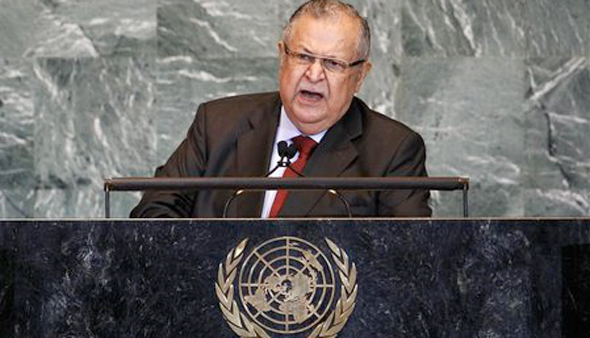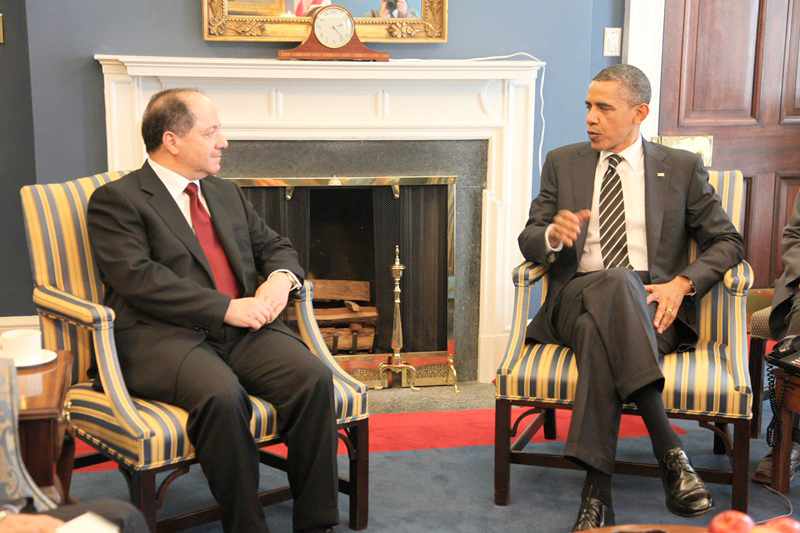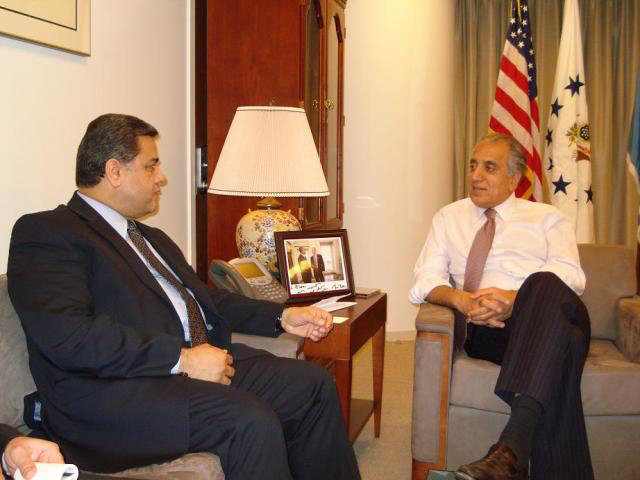Iraqi Kurdistan: Good Relations at Top of KRG Foreign Policy List
Kurdish foreign relations are in a process of quick evolution as former foes become development partners, such as with Turkey and Iran, where there have been respective degrees of rapprochement have been reached.

Good relations at top of KRG foreign policy list
By T.K.Maloy
ERBIL: Kurdish foreign relations are in a process of quick evolution as former foes become development partners, such as with Turkey and Iran, where there have been respective degrees of rapprochement have been reached.
What stands out in the KRG’s growing and robust diplomatic activities is that under the 2005 Iraqi Constitution, foreign affairs is – at least in theory – the exclusive domain of federal Iraq.
What stands out in the KRG’s growing and robust diplomatic activities is that under the 2005 Iraqi Constitution, foreign affairs is – at least in theory – the exclusive domain of federal Iraq. In practice, the KRG has developed an almost entirely parallel diplomatic service, the Kurdistan Department of Foreign Affairs, and essentially promulgates the majority of its own policy, more often than not forging bilateral and multilateral relations on its own bat.
This, of course, leads to some complexities, with allies such as the US not always wanting the KRG to completely devolve its own policy from an Iraq that was bought and paid for in American blood and treasure.
But, for most living in a world of realpolitik, the reasons for the KRG’s separate foreign affairs is obvious – economic, ethnic, and the fact that the remainder of Iraq is generally unstable.
In the case of Turkey and Iran, the KRG has been able in part to step in and quell restive Kurdish populations in those countries, at least temporarily.
There has been a longtime aspiration of the Kurdish people in all these various areas, (including Syria as well,) to form a single nation. But the KRG must weigh on balance its economic and strategic political interest versus acting as the fulcrum for the formation of omnibus Kurdish state which would alienate trading partners Turkey and Iran.
In a recent interview with Marcopolis, KRG Prime Minister Nechirvan Barzani noted of the region’s foreign policy going forward: “Since the founding of the Kurdistan Region, we have tried to reach out to the international community to ensure there is general understanding about the differences between our region and the rest of the country (federal Iraq). This remains another key aspect of our policy and objectives with the international community.”
There have been a series of key bilateral exchanges in the last several years including visits by KRG President Masoud Barzani in 2011 to the Islamic Republic of Iran and the Republic of Turkey
At the time of these initial visits by Barzani, the KRG foreign minister Falah Mustafa Bakir told the Kurdish Globe newspaper: “I believe that this is an important moment in our history and thus (our) relations with neighboring countries and the international community are essential for us. As you have mentioned, we have always wanted relations based on mutual trust, mutual respect and mutual understanding, and also to have the kind of relationships that are mutually beneficial for both sides”
He noted that the KRG has been able to make significant progress in its relations to these two nations and that improved relations will benefit the Kurdish autonomous region in terms of “stability, security, economic development and overall prosperity.”
Asked by the Globe if the KRG could act as peace broker in Tehran and Ankara regarding those nation’s respective Kurdish populations, Foreign Minister Bakir said: “We have always stated very clearly that we support and sympathize with the rights of the 
Kurdish people wherever they may live and have always encouraged them to find peaceful and democratic solutions to problems with the governments in their respective countries so that they could obtain a prosperous and bright future.”
He went on to disavow any violent means or assistance from the KRG to Kurdish political/military groups outside the autonomous region. If for any reason, so as not to disturb the stability and security of autonomous Kurdistan, the region’s top selling point to foreign investors.
“We will not endorse any plans that involve violence and conflict,” he said.
He noted that since the PJAK and Islamic Republic of Iran reached an agreement on ending any fighting, this leaves each respective group and opportunity for initiatives geared toward long-term peace, stability, economic growth, and investment and job opportunities.
The KRG can also said to be very busy the area of “business diplomacy.” In an effort to boast the Kurdish region’s private sector, the KRG has been aggressive in hosting trade conferences in Kurdistan and in sending trade missions abroad.
KRG officials have visited Austria, Slovakia, Spain, Italy, the UK, Poland, the United States, Turkey, Iran and Qatar.
Countries that have led mission to the region range from the UK, France, Germany, Italy, Austria and Spain, to the Netherlands, Northern Ireland, Turkey, Kuwait, Iran, Saudi Arabia, the UAE, China and South Korea.
In October, President Masoud Barzani welcomed the largest ever American business delegation to date, which was visiting the region as part of the Erbil International Fair.
The US-Kurdistan Business Council led a delegation of 48 members representing 30 companies from a diversity of business sectors.
With a policy that is still nascent, the PM noted that “The KRG has 14 representations across the world that are used to promote political, economic and cultural ties between Kurdistan and the world at large, and we are welcomed in many capitals as heads of states.”
Of key importance in its business diplomacy has been contracts with such transnational oil giants as ExxonMobil, who has made deals with the KRG exclusive of review by federal Iraq.
Asked by Marcopolis about what role the PM envision for the Kurdistan Region on the international scene, Nechirvan Barzani strongly emphasized that: “After decades of isolation and sanctions, we want to be part of the international community. Our people are very friendly and welcoming, and we want to share our culture and experience with other friends and allies.”
With a policy that is still nascent, the PM noted that “The KRG has 14 representations across the world that are used to promote political, economic and cultural ties between Kurdistan and the world at large, and we are welcomed in many capitals as heads of states.”
Going forward, the PM said: “We will continue this experience and help contribute to the rest of the country so long as we are part of a federal, democratic and constitutional Iraq.
Adding that, ”Our representations are also playing a key role in ensuring that the world understands and recognises the difficulties that we have had to endure during our painful history; this recognition will play an important and symbolic role to prevent such crimes occurring again.”